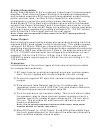
9
Tube Reliability:
It's interesting to note that until the 1960's, tubes were used in
every area of electronics including aviation. When people flew on a
commercial airliner, they literally trusted their lives on tube-powered
avionics. So, aside from a common-sense warning to take care not
to break the glass, there is very little reason to be concerned about
the 6SL7GC tubes within your amplifier. Without them, the
musicality of your amp would greatly diminish!
Butler's design has reduced the electronic stress on the tubes to
less than 5% of rated value and NO dangerously high voltages are
needed for operation. Therefore, heat production from the tubes is
minimal. BK Butler has been a pioneer in the use of low-voltage
vacuum tubes and time has proven him correct in his long assertion
that correctly employed, vacuum tubes don't need lethal voltages
to be highly musical. (Just ask Eric Johnson - repeatedly voted by
Guitar Player Magazine as the world's best guitarist, Billy Gibbons
of ZZ Top, or Pink Floyd's David Gilmour if BK Butler's low voltage
tube guitar pedals aren't the most reliable and best sounding ever
made!)
What this means to you is that the tubes installed in your new Butler
amplifier should last as long as the other high quality electronic
components in the design. No special tube care, replacement,
matching, biasing or maintenance is usually necessary. In the
unlikely event a tube becomes faulty,* each tube is connected to
the power module via a high-reliability multi-pin connector so
replacement is simplified.
Finally, the most likely reason you invested in your new Butler Audio
amplifier was to enjoy the sonic superiority vacuum tubes create.
Please enjoy this revolutionary design BK Butler worked so long to
produce. We're confident you'll have many trouble-free years of
listening pleasure!
- Everyone at Butler Audio, Inc
*The only external visual check possible by the customer is to look through the front panel
louvers for the 2 glowing orange/red tips at the top of each tube during operation. The
blue illumination should continue, but if a particular channel becomes inoperative and its
tube has no glowing filament tips, that tube is likely defective and should be replaced.













